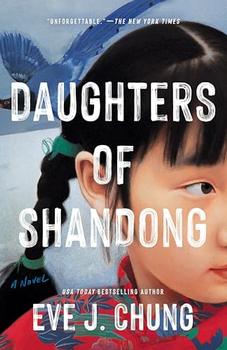Summary | Excerpt | Reading Guide | Reviews | Beyond the Book | Readalikes | Genres & Themes | Author Bio

1
Heirless
Nai Nai said whores weren't allowed in the house, so she kicked Mom out, slamming the wooden door shut with a clatter that startled the birds. We didn't know where my sister Di was, but Three and I sat beside Mom as she leaned against the courtyard wall of our shiheyuan, hands red and chapped from washing dishes. "Don't worry," she said to us. "She'll calm down when your father comes home." Nai Nai was a small, thin lady with ebony hair, birdlike hands, and dainty bound feet. Yet, even as she tottered in her small silk slippers, she had the presence of a warlord and a tongue like a whip. I was eleven, and old enough to know that no one could calm her after such a rage, not even her first and favorite son.It was fall, and dried leaves swirled in the chilly wind, skimming yellow grass that swayed gently. Luckily, the harvest was finished and most of the workers had gone home. Mom didn't want reports of this shameful spectacle to make the rounds-the peasants hated Nai Nai as much as they loved gossip, and this story would have spread like a wildfire. We lived in rural Zhucheng, a small town where my family reigned. For generations, our men had excelled in imperial exams, earning prestigious government positions and building an empire through renting land and running businesses. Our palatial shiheyuan, with its gleaming orange tiles and wooden latticed panels, was an ostentatious testament to our wealth. Magnificent stone lions framed the entrance of the courtyard, which was large enough for a lotus pond full of shimmering koi. They swam in circles lazily, eyes globular, and gulped at two-year-old Three as she peered into the water.
Nai Nai had a nose for lies and could almost always tell when a secret lurked inside her walls. Still, Mom had been hiding her pregnancy for weeks. "It will be a boy this time. I can feel it, Li-Hai," she said to me repeatedly, as though her anxious mutterings could manifest a son. As soon as I was born, I was a disappointment. When Second Sister arrived one year later, she was a failure. Father wistfully named her Li-Di, since di meant "younger brother." Then Third Sister came along, a catastrophe so horrific that she got only a number: Three.
Three girls rattled the Angs enough for Nai Nai to take drastic measures. Though she watched every coin like it was a fragment of her soul, she decided to trade an ounce of gold for a glimpse into the future. Together, she and Mom went to a famous fortune-teller in a neighboring town and asked if a male heir was forthcoming. Mom wrote down the date and time of her birth as he examined the lines on her palm, reading it like it was a map of her life. Handing Mom an amber amulet for protection, he declared solemnly that Mom would not have a son until she turned thirty-six.
Mom was only in her late twenties then, but Nai Nai came home giddy, delighted that an heir would arrive eventually. She ordered my parents to sleep in separate rooms and forbade them from having intercourse until Mom's thirty-sixth birthday. Lauding herself for her ingenuity, she boasted, "This will save us the expense of raising additional daughters!" After all, girls were nothing more than wives for other people's sons.
Father obeyed and set up his own bedroom, but he told Nai Nai that fortune-tellers were a scam. "We make our own fate," he insisted, a feeble protest that she ignored. At night, Nai Nai remained a vigilant guard, monitoring the hallway with bizarre frequency. Despite her enthusiasm, even the fiercest dragon succumbs to slumber. A few months later, Mom became pregnant for the fourth time.
"Don't tell anyone," Mom whispered to me, and continued her chores as though nothing had changed. Every morning, she woke up at four a.m. to cook breakfast for about eighty workers who lived on and tilled our land. They began work at dawn, so Mom had to grind flour by lamplight. She was a fantastic cook, and made buns and dumplings like they were art. With deft hands, she could roll dough thin like paper for butterfly wontons, knead fluffy, airy dessert bun clouds, and pull springy, chewy bread that rose like soldiers saluting in the steamer.
Excerpted from Daughters of Shandong by Eve J. Chung. Copyright © 2024 by Eve J. Chung. Excerpted by permission of Berkley Books. All rights reserved. No part of this excerpt may be reproduced or reprinted without permission in writing from the publisher.
Your guide toexceptional books
BookBrowse seeks out and recommends the best in contemporary fiction and nonfiction—books that not only engage and entertain but also deepen our understanding of ourselves and the world around us.